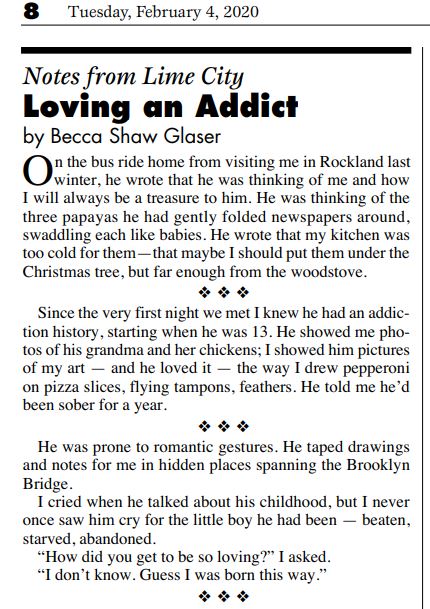by Becca Shaw Glaser February 4, 2020, The Free Press
On the bus ride home from visiting me in Rockland last winter, he wrote that he was thinking of me and how I will always be a treasure to him. He was thinking of the three papayas he had gently folded newspapers around, swaddling each like babies. He wrote that my kitchen was too cold for them — that maybe I should put them under the Christmas tree, but far enough from the woodstove.
***
Since the very first night we met I knew he had an addiction history, starting when he was 13. He showed me photos of his grandma and her chickens; I showed him pictures of my art — and he loved it — the way I drew pepperoni on pizza slices, flying tampons, feathers. He told me he’d been sober for a year.
***
He was prone to romantic gestures. He taped drawings and notes for me in hidden places spanning the Brooklyn Bridge.
I cried when I he talked about his childhood, but I never once saw him cry for the little boy he had been — beaten, starved, abandoned.
“How did you get to be so loving?” I asked.
“I don’t know. Guess I was born this way.”
***
Early on I bought us tickets for a fancy opera and he didn’t show. I called and called, left messages, texted, panicked he was dead in a cocaine storm or with bloody wrists, and it wasn’t until I left for home at intermission that he let me know he’d collapsed in bed after work. He just lay there staring at the ceiling, letting the phone ring, while I left panicked voicemails.
“I don’t know what happened,” he said.
***
On my 35th birthday, he offered to cook me a birthday meal. I took the subway up the hour and a half trip to his place, excited to see him. When I got to his apartment, he was MIA. Again I left message after message, started to have trouble breathing. After an hour, I pounded on the window’ the top half smashed down. A startled grunt came from inside; the curtain parted.
His lips were purple, bloated, he looked dazed. He was so apologetic, admitted he had gotten high after work.
It was the first time I saw him like that. I didn’t know what to do. The loving-an-addict narrative is that the addicted person needs to reach “rock bottom,” you don’t want to “enable” them. I felt like I was supposed to leave him there alone, to “teach him a lesson.” But the thing is, he was coming down from the high. He wasn’t mean; he was sweet, penitent. He said he was glad I saw him like that. “Now you know the real me.”
How would me leaving in a huff have helped convince him to stop using? Addiction doesn’t listen to logic. People abandon their children for it. People lose their lives to it.
***
When I moved away from New York City sometimes I would visit with bags of groceries, and he would nearly cry, thanking me. Even though he could barely pay rent (while working a — under-paid and exploitative — full-time job) along with his full-on cocaine addiction, he would often give a dollar to homeless men on the street. Later, he told me that at that time he had basically decided to die, to let the addiction take him.
***
Eventually he ended up very sick, homeless. These days he is stable (with many chronic health issues) and — as far as I know — avoiding cocaine. How did he get here, after so many years of using, so many years of trying to get sober? I think everyone’s recoveries are a bit mysterious. But he says if it weren’t for me and his dad, he would not be alive. I think that having a few unconditionally supportive people was crucial. But I also believe that the low-barrier state-supported housing he now lives in has been transformative. Thankfully, New York has this option, but, unfortunately, in Maine we have very few resources for those in need.
I love that he is doing well. I love that our cultural imagination of what addiction and recovery can look like is changing. Many people are turning away from the of idea of someone having to hit rock bottom to recover. That’s important because embracing harm-reduction approaches leads to fewer tragedies. Tragically, though, no matter what we do, there will be people who try endlessly to help their loved one with an addiction, and sometimes that person will not make it.
Recovery never ends. As a Rockland neighbor who is in long-term recovery recently told me, “It ain’t what you know, it’s what you do.” Someone may intellectually know everything there is to know about addiction, but if they go back even once more to the addictive substance, the cycle of addiction can start again.
